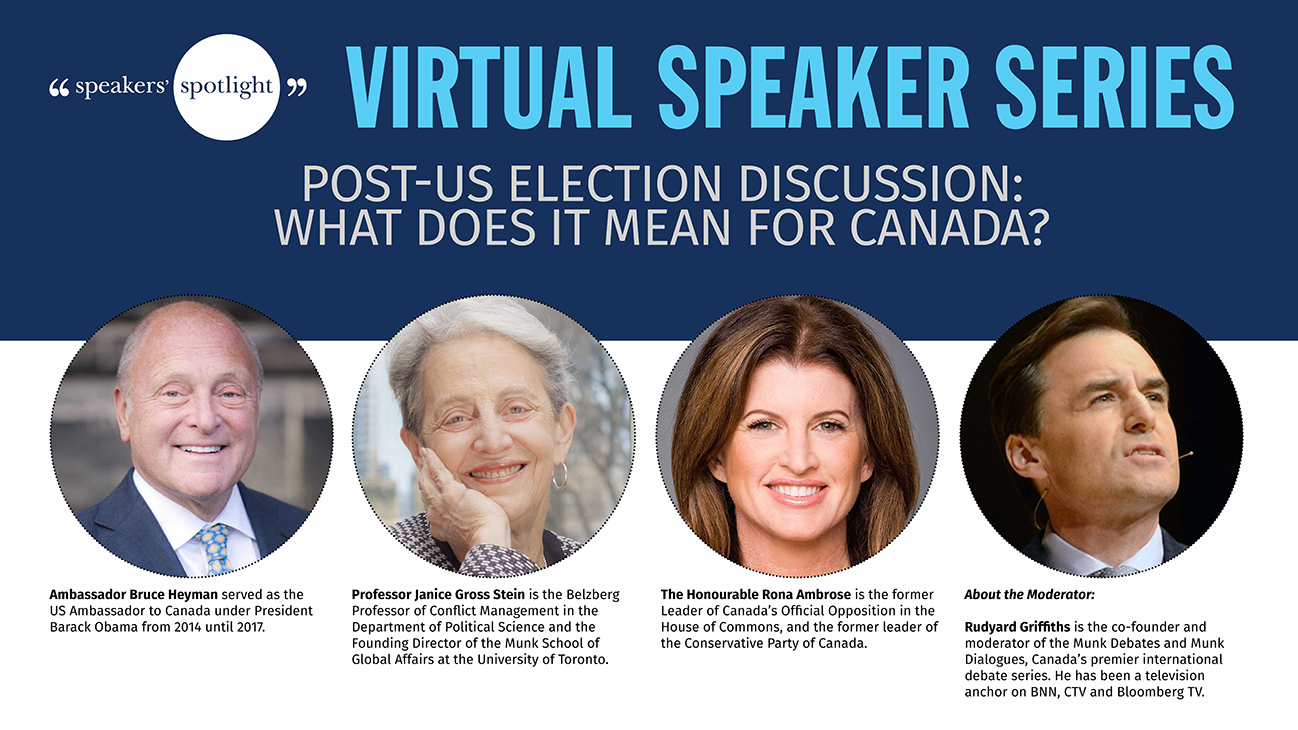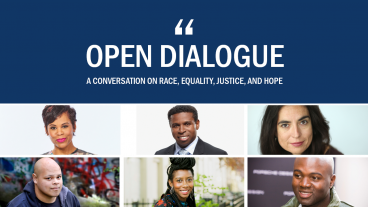This week, as part of our Virtual Speaker Series, we hosted a special panel discussion to talk about the short- and long-term impact of the Nov. 3 US election—both here in Canada and across the globe. Our esteemed guests for this important conversation were Ambassador Bruce Heyman, The Hon. Rona Ambrose, and Professor Janice Gross Stein, with Munk Debates co-founder Rudyard Griffiths in the role of moderator.
The lively, hour-long discussion covered a significant range of topics, with the panelists fielding questions both from Griffiths and the audience. Below is a summary of the questions and responses from the group, but please note it is not a word-for-word transcription (unless otherwise noted). Also included are several clips excerpted from the full event.
Ambassador Bruce Heyman was asked to open the day’s chat by offering his takeaways from the election proceedings.
Heyman’s response was that we should see the turnout and process as a sign that democracy is alive and well in the US. President-elect Biden has a huge margin of the popular vote, and also now hold the record for most votes cast in his name of any US presidential candidate. However, there are challenges. “To say [President Trump] has been disruptive is perhaps the kindest thing I could say about him right now,” Heyman said. He pointed to Trump having trouble grasping the facts and realities of the moment, both in terms of the election and the ongoing pandemic. Heyman said that the pandemic is the biggest issue for the US at the moment and it will be Biden’s No.1 priority when he transitions into the office. In the meantime, the president and his inner circle continue to spread distrust in the election process, claiming fraud with little or no evidence. In spite of this, Heyman was heartened to see that the election itself went smoothly and was not marred by any large-scale violence, which many had feared was a possibility.
Moving on to the results themselves and their effect on Canada, Griffiths asked Ambrose to weigh in on how the Trudeau administration is likely preparing in the wake of a likely Biden presidency.
Ambrose pointed out that it is standard practice for the Prime Minister and his team to begin preparing for the next four years of US executive administration once the platforms for the two main contenders are made public. They would closely examine the proposed plans and high-priority concerns of either a Biden or Trump administration moving forward, and flag possible issues for Canada-US relations. She pointed to a trend towards “buy American” policies and trade guidelines the have a direct and major impact on the Canadian economy. Ambrose also noted that Biden’s proposed energy policy is arguably more progressive than that of Trudeau and, since Canada relies on the US as a major buyer of our energy products, that will definitely be a point of discussion moving forward. Topics like the Keystone Pipeline, along with possible carbon taxes and tariffs on Canadian goods will definitely be top of mind for early Trudeau-Biden administration discussions. Overall, she said, more predictability and a better tone from the top under a Biden administration is a good thing for us, but there will still be issues of contention between our governments.
Turning to the world stage, Stein was asked about what to watch for in terms of where international politics might be headed under a Biden government.
Stein pointed out that it’s important to remember that presidential administration transitions often take time, usually something in the area of 6-to-12 months. On top of that, it looks like the Republicans will continue to control the Senate, which is needed to approve appointments by the Biden government. While that might mean some slower-than-expected moves in the short-term, Stein said that we should expect Biden and his team to work much more closely and comfortably with traditional allies in contrast with the Trump administration. She pointed to the WHO and WTO as both being hamstrung under Trump, as they normally work closely with the US government to decide international policy. One of the major concerns between the US and Canada that Stein said we should expect more collaboration, is regarding economic and political policy towards China.
While on the subject of China, Griffiths took a question from the audience regarding “The Two Michaels”—Candian citizens Michael Kovrig and Michael Spavor currently being held under espionage charges by the Chinese government. Were we likely to see any action on Biden’s part to resolve this situation?
Heyman responded first, pointing out that there is a large list of priorities in regards to China. He argued that, under Trump, the US had largely abdicated its leadership role in this area and we should expect that to change under Biden. However, Ambrose chimed in that we shouldn’t expect too much of a change regarding this specific issue because Canada is already doing all it can to guarantee the return of these two men. It shouldn’t be seen as a fault of Trump when the Chinese government is at fault for taking an illegal action. Heyman responded that he agreed China is at fault, however his point was more that recent US behaviour was not an effective deterrent to such actions by another nation. China overstepped at this time because they knew they could do so with little repercussions from the US.
Staying on policies regarding China, Griffiths relayed another audience question about whether or not the model of something like NATO was a good example of a coalition approach for the US, Canada, and other nations effected by China’s political ambitions.
Stein jumped in to respond to this, pointing out that, in her opinion, NATO was not a good analog for this kind of coalition. She didn’t think that kind of organization would be effective, as it was largely military focused. The relationship with China involves broader and deeper issues, including trade, economic policy, and technology. Stein said it would require a smarter, more thoughtful approach than coalitions we’ve seen in the recent past. She also noted that she saw the US as being in a position “amidst” the powerful nations of the world rather than “atop” the hierarchy as it once was, as recently as the Obama administration. As she saw it, a less powerful US is worse for Canada overall since we are so closely related in every way.
The discussion pivoted at this point towards trade and economic policies between the US and Canada. Griffiths asked about how a Biden admin might effect trade deals, and also followed up with a question about the energy market.
Stein pointed to the history between Biden (as Obama’s vice president) and Trudeau as being a positive in our favour moving forward. However, trade is always a hotly contested issue and the public perspective on the idea of “free trade” has definitely shifted since Trump took office in 2016. We’re entering into new territory, even if there the federal level administrations are more friendly with one another. Stein referenced the huge amount of resources mobilized during the US-Mexico-Canada Trade Agreement discussions, and said it’s possible that might need to become the norm.
Following up on this subject line, Ambrose pointed to trade items like dairy, cheese, and softwood lumber as always being touchy subjects for our two countries since they are produced in key ridings and regions, politically speaking. As for the energy market, climate change is a major issue that will only become more important in the coming years. She said that Biden and Trudeau seem to be on approximately the same page regarding progress towards solving this issue. We share our ideological point of view, Ambrose said, but we don’t know how aggressively Biden will focus on climate change during his first term. That will certainly have an impact on our policies.
Speaking of Biden’s first term, Griffiths asked a question from the audience about what could realistically be accomplished under his administration.
Heyman stepped in to answer this question. He pointed to the first-term of any president as being impacted by the transitional period, even in the best of times. Realistically, he said, a president could only accomplish progress on one or two major issues during their first term. However, Heyman indicated that there are easily several major issues that need immediate attention starting in 2021, including: getting the pandemic under control/recovering from it; climate change issues; rising unemployment and a demand to rebuild US production and manufacturing; and then the complex and multi-faceted issues to do with race and immigration. Heyman said that even with so much on his plate, it’s likely we’ll see the Biden administration enact a major infrastructure investment plan to help with job/economy recovery, as well as moving towards climate goals.
Wrapping up, Griffiths asked Ambrose if she could give some insight into where the Republican party might go from here, following President Trump’s apparent defeat in the election and his acrimonious reaction in the aftermath.
Ambrose wanted to remind the audience that Trump has huge support among American voters. As she saw it, the democrats have played dangerous games by calling out racism and discrimination, both from President Trump and his supporters. He will continue to have a major influence, both on the party and on American politics overall. She said that the GOP would either have to try to play ball with him to maintain his support, or basically dismantle the current party and start over—though neither seemed to be a very appealing proposition. “I don’t know how you manage a person like Donald Trump,” Ambrose said.
About the Panelists
Ambassador Bruce Heyman served as the US Ambassador to Canada under President Barack Obama from 2014 until 2017.
The Honourable Rona Ambrose is the former Leader of Canada’s Official Opposition in the House of Commons, and the former leader of the Conservative Party of Canada.
Professor Janice Gross Stein is the Belzberg Professor of Conflict Management in the Department of Political Science and the Founding Director of the Munk School of Global Affairs at the University of Toronto.
About the Moderator
Rudyard Griffiths is the co-founder and moderator of the Munk Debates and Munk Dialogues, Canada’s premier international debate series. He has been a television anchor on BNN, CTV and Bloomberg TV.




